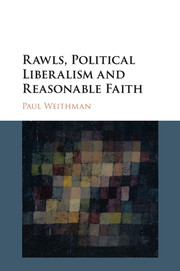Book contents
- Rawls, Political Liberalism and Reasonable Faith
- Rawls, Political Liberalism and Reasonable Faith
- Copyright page
- Dedication
- Contents
- Works by John Rawls
- Introduction
- Part I The undergraduate thesis
- Part II From A Theory of Justice to Political Liberalism
- Part III Public reason and its role
- Part IV Rawls, realism and reasonable faith
- Bibliography
- Index
- References
Bibliography
Published online by Cambridge University Press: 05 August 2016
- Rawls, Political Liberalism and Reasonable Faith
- Rawls, Political Liberalism and Reasonable Faith
- Copyright page
- Dedication
- Contents
- Works by John Rawls
- Introduction
- Part I The undergraduate thesis
- Part II From A Theory of Justice to Political Liberalism
- Part III Public reason and its role
- Part IV Rawls, realism and reasonable faith
- Bibliography
- Index
- References
- Type
- Chapter
- Information
- Rawls, Political Liberalism and Reasonable Faith , pp. 242 - 247Publisher: Cambridge University PressPrint publication year: 2016

